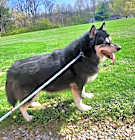Kai Ken are medium-sized dogs. Kai Kens are about 17 to 22 inches tall at the shoulder, females are slightly smaller. This breed’s weight ranges from 30 to 40 pounds, with males generally heavier than females.
Kai Ken
Breed Type: Asian and Oceanian
Common nicknames: Kai Ken, Tiger Dog
Coat: Double
Hypoallergenic: No, they will likely trigger allergies.
Temperament: Loyal, smart, calm, affectionate
Life expectancy: 12-15 years
Color & patterns:

The Kai Dog, also known as the “Tiger Dog,” blends intelligence, loyalty, and an independent spirit. With their medium-sized build and distinctive brindle coat, these dogs are striking but can be reserved with strangers. They are affectionate and devoted to their families, however, and form strong bonds with their loved ones. The Kai Dog has a fascinating history deeply rooted in Japan, where they were originally bred as hunting dogs and were known for their exceptional tracking skills and sharp instincts. Kai Dogs are intelligent, quick learners who are highly trainable with consistent and positive reinforcement methods. If you’re looking for a loyal and intelligent pup, the Kai Dog might be the companion for you
Kai Ken characteristics
Learn about about Kai Ken basics like their fur colors, shedding levels, how much grooming they need, and other Kai Ken facts.
Average height
17-22 inches (43.2-55.9cm)
Average weight
30-40 pounds (13.6-18.1 kg)
Average lifespan
12-15 years
Exercise needs
Grooming needs
Full-grown size
Good with cats
Good with kids
Training aptitude
When do Kai Ken stop growing?
Kai Ken typically stop growing by around 12 to 18 months of age. While they might reach their full height by about 10 to 12 months, they often continue to fill out and gain muscle mass until they are about 18 months old.
What colors do Kai Ken come in?
Kai Ken have a brindle coat pattern, which consists of tiger-striped markings, where darker stripes are interspersed with lighter base colors. They can come in a few specific colors, including black brindle, medium brindle, and red brindle.
Do Kai Ken shed?
Yes, Kai Ken shed. They typically shed more heavily during the spring and fall as they transition between their winter and summer coats. They shed moderately year-round, though their normal shedding is usually less intense than the seasonal molts. Despite shedding, the Kai Ken’s coat is relatively low-maintenance compared to some other breeds.
Kai Ken temperament
Learn about about the Kai Ken temperament and how well they fit into your lifestyle, home environment, and family.
Are Kai Ken dogs good with kids?
Yes, Kai Ken dogs are good with kids in general. They tend to be loyal, gentle, and protective, especially when properly socialized. Their natural instincts make them alert and cautious, which can help them protect their families, including children.
However, like any breed, early socialization and proper training are important to ensure they interact well with kids. Supervision is always recommended when dogs and young children are together to ensure a safe and positive relationship. Teaching children how to safely interact with dogs can also help prevent any potential misunderstandings or accidents.
Are Kai Ken good with cats?
Yes, Ken can coexist with cats, but it largely depends on their individual temperament and early socialization. Since they have strong hunting instincts, it’s important to introduce them to cats at a young age. With proper training and supervision, Kai Ken can live harmoniously with cats. However, unsocialized or prey-driven Kai Ken might be more inclined to chase cats. Supervised, gradual introductions and positive reinforcement help foster good relationships between Kai Ken and cats.
Are Kai Ken good with other dogs?
Yes, Kai Ken can get along well with other dogs. Their natural behavior is often independent but not overly aggressive, which allows them to coexist with other dogs. However, their strong hunting instincts and territorial nature might cause them to be wary of unfamiliar dogs. Early and consistent socialization is key to ensuring they are comfortable and friendly around other dogs.
Do Kai Ken bark a lot?
No, Kai Ken do not typically bark a lot. They tend to be quiet and reserved, especially indoors. However, like many dogs, they might bark to alert their people to something unusual, particularly if they sense a threat or unfamiliar presence. Training and proper socialization can play a significant role in managing their barking tendencies as well.
Are Kai Ken good family dogs?
Yes, Kai Ken are good family dogs. Their loyalty, intelligence, and calm demeanor help them bond closely with family members. Although naturally cautious, they are affectionate with and protective of their family. Kai Ken are good with children when properly socialized, and their moderate size makes them manageable in a family environment. They thrive with active families that can provide them with regular exercise and mental stimulation.
Are Kai Ken easy to train?
Kai Ken are generally intelligent and trainable but are also independent and sometimes stubborn. They respond well to consistent, positive reinforcement-based training methods. Early socialization and firm leadership from a confident trainer are essential to guide their behavior. Although they are not as eager to please as some breeds, their loyalty and bond with their people can make training successful if approached with patience and understanding. Training any dog takes substantial time and effort, regardless of breed.
Are Kai Ken smart?
Yes, Kai Ken are smart dogs. They are highly intelligent, which makes them quick learners. Their intelligence, paired with their independence, means they can think critically and solve problems, especially in hunting situations. However, their independent nature can also make them a bit stubborn, so although they understand commands quickly, they need consistent training to stay focused and obedient.
Are Kai Ken friendly?
Kai Ken are generally friendly but can be reserved with strangers. They typically warm up to new people once they feel comfortable and trust their environment. Early socialization is key to ensuring that Kai Kens are confident and friendly around others, both human and canine. Their overall demeanor is calm and composed, making them good companions in the right household.
Kai Ken health
Learn about about the Kai Ken health outlook and what diseases they may be prone to at various stages of their life.
Do you need to groom a Kai Ken?
Yes, you need to groom a Kai Ken to keep their coat in good condition and manage shedding. Brush your Kai Ken at least once a week, with more frequent brushing during heavy shedding periods in the spring and fall. Bathe your Kai Ken as needed, typically every six to eight weeks or when they are dirty. Trim your Kai Ken’s nails every two to three weeks to keep them from becoming too long. Finally, brush your Kai Ken’s teeth daily to maintain dental health and prevent tartar buildup.
Do Kai Ken have health issues?
Kai Ken are generally healthy dogs with a few potential health concerns to watch for. Like all breeds, they can be prone to certain conditions but are not known for having specific hereditary health issues. Common concerns for the breed include hip dysplasia, eye problems, and allergies. Regular vet check-ups, a healthy diet, and proper exercise can help keep a Kai Ken in good health.
Are Kai Ken hypoallergenic?
No, Kai Ken are not hypoallergenic. Like most dog breeds, they shed fur and produce dander, which can trigger allergies in sensitive individuals.
Kai Ken history
Learn about where this Kai Ken came from!
What does Ken mean?
In Japanese, the word “Ken” (犬) means “dog.” It is commonly used in the names of various Japanese dog breeds. Kai Ken refers to the dog from the Kai region, so “Kai Ken” means “Kai Dog.”
Where are Kai Ken from?
Kai Ken are from Japan, specifically from the Kai Province on Honshu Island, which is now part of modern-day Yamanashi Prefecture. Kai Ken are one of Japan’s six native dog breeds and are considered a national treasure. Bred for hunting, particularly in the mountainous regions of Kai Province, these dogs are known for their agility, strength, and natural hunting instincts. The breed was used primarily to hunt game such as wild boar and deer.
What is the history of Kai Ken?
The Kai Ken is believed to have descended from ancient Japanese dogs that lived in the remote, mountainous areas of the Kai region. Isolated by the rugged terrain, the breed developed with minimal outside influence. The breed remained largely unknown outside of Japan until the early 20th century, when efforts were made to preserve Japan’s native dog breeds.
The breed was prized for its ability to hunt and track a wide variety of game, including wild boar, deer, pheasant, and small game. The Kai Ken’s distinctive brindle coat, also known as “tora” (Japanese for “tiger”), provided natural camouflage in the dense, wooded areas of the region, making them even more effective hunters.
How many types of Kai Ken are there?
There is one breed of Kai Ken, but within the breed, there are two distinct body types or varieties based on their physical appearance. The shishi-inu-gata (boar dog type) has a more stocky, muscular build with a broader head. It is robust and powerful, suited for taking down large game including wild boar. The shika-inu-gata (deer dog type) has a leaner, more slender build with a narrower face and longer legs. It is typically faster and more agile, suited for chasing smaller game like deer.
Are Kai Ken rare?
Yes, Kai Ken are rare, both in Japan and internationally. Although they are one of Japan’s six native dog breeds, they are less common compared to other Japanese breeds, such as the Shiba Inu or Akita. Kai Ken developed in relative isolation, which limited their spread and population growth outside the region. In Japan, the breeding population of Kai Ken has remained relatively small. Outside of Japan, Kai Kens are even rarer.
How long do Kai Ken live?
Kai Ken live 12 to 15 years on average, which is relatively common for medium-sized dogs. Their longevity can be attributed to their generally good health, robust genetics, and active nature. Providing proper care, regular veterinary check-ups, a balanced diet, and maintaining a healthy weight can also contribute to helping dogs of all breeds live long and healthy lives.
Find Kai Ken puppies near you
Adopting a Kai Ken
We don't see any Kai Ken dogs available for adoption in your exact location or cities near you, but here are some adorable similar breeds in Columbus, OH.

Almond
Chow Chow Mixed Breed (Medium)
Female, 7 mos
Delaware, OH
Good with dogs
Not good with cats

Heidi
Alaskan Malamute
Female, senior
Mt. Gilead, OH
Not good with dogs
Not good with cats
Needs special attention
House-trained
Spayed or Neutered

Almond
Chow Chow Mixed Breed (Medium)
Female, 7 mos
Delaware, OH
Good with dogs
Not good with cats

Heidi
Alaskan Malamute
Female, senior
Mt. Gilead, OH
Not good with dogs
Not good with cats
Needs special attention
House-trained
Spayed or Neutered
